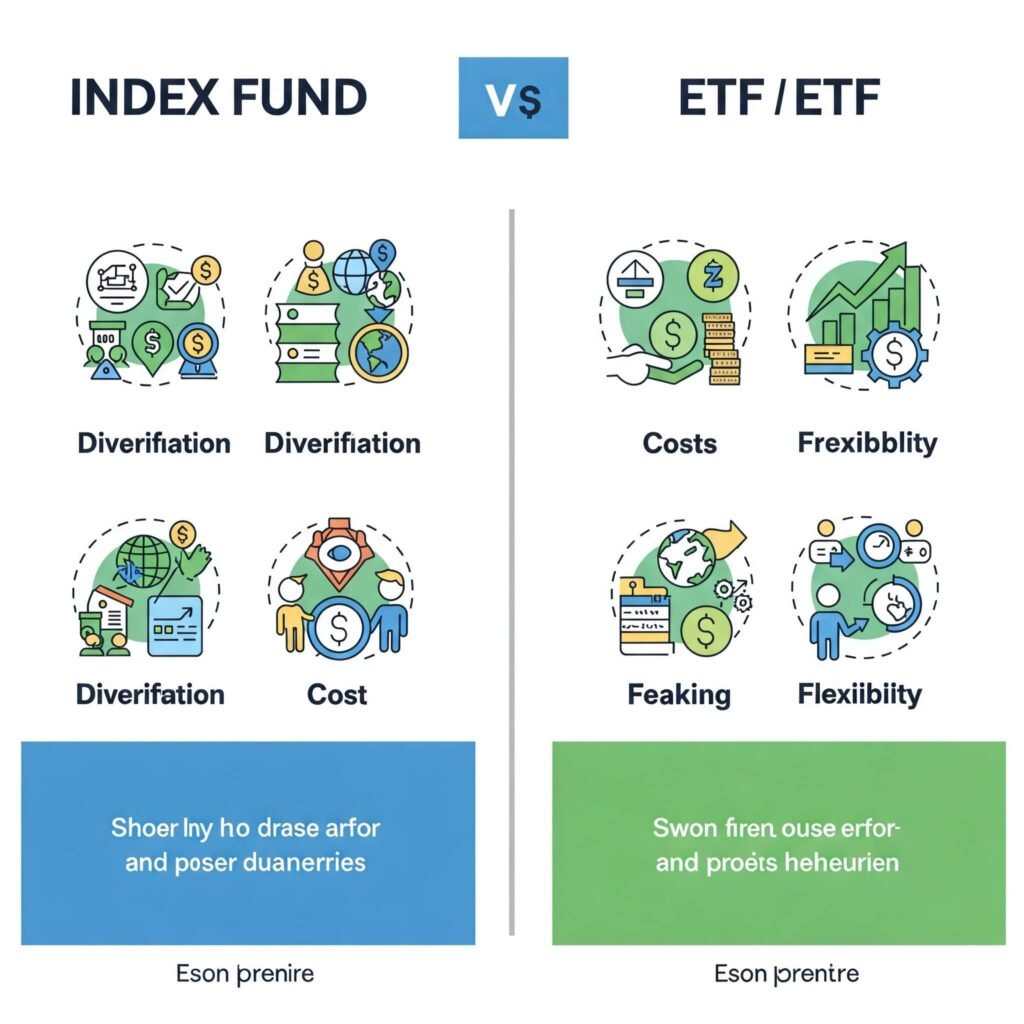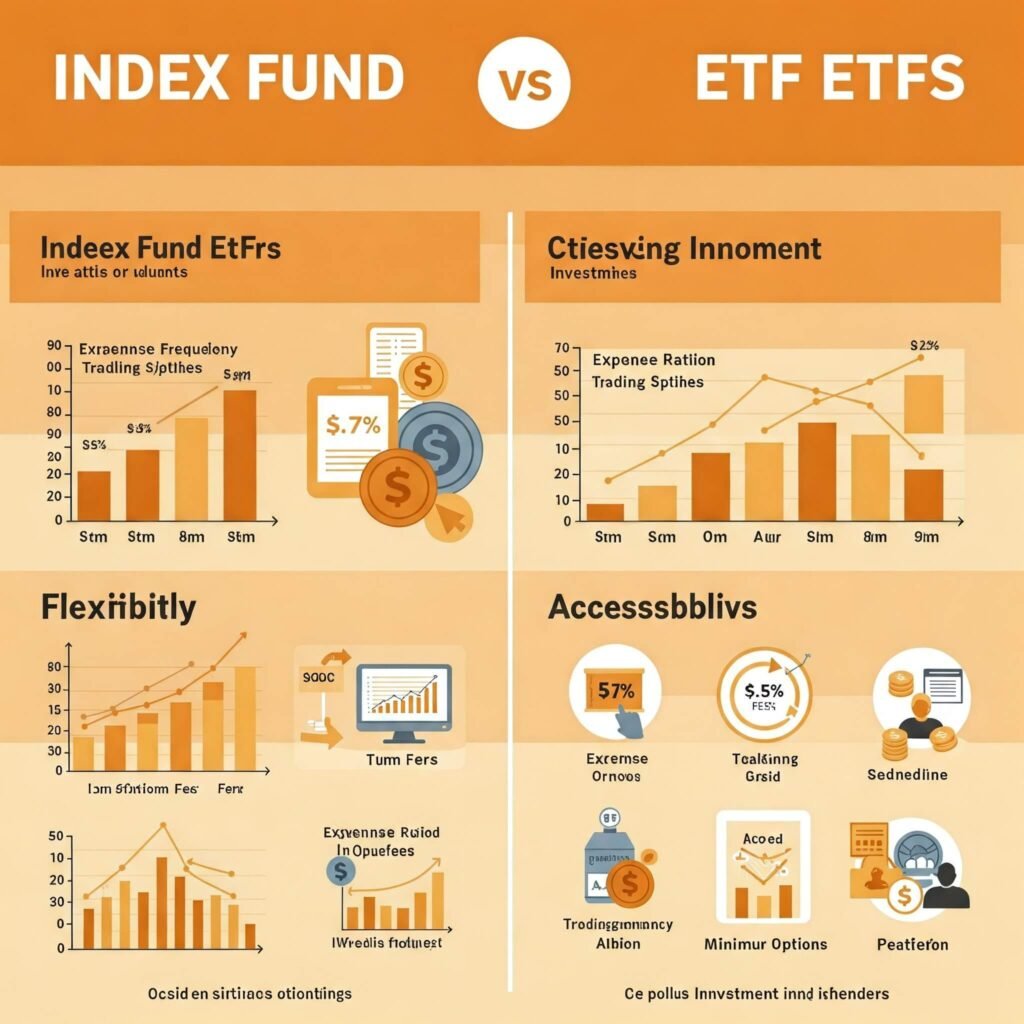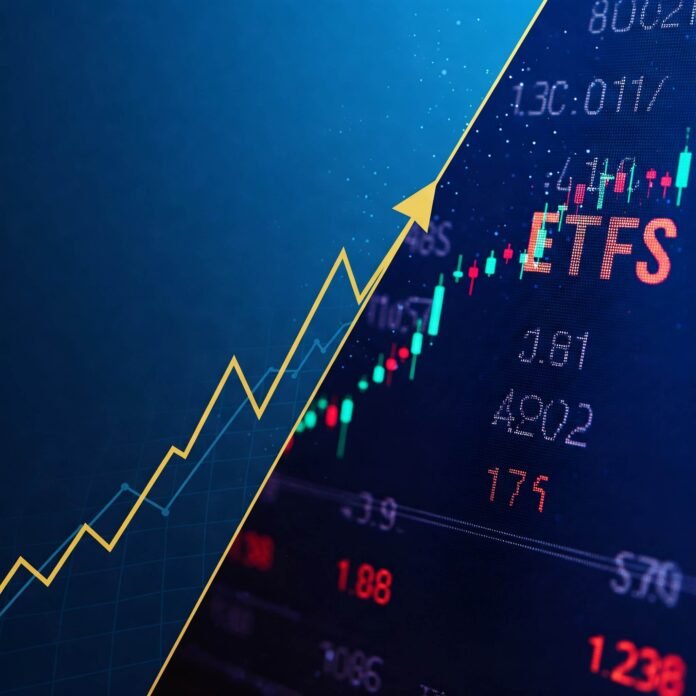Man, index funds vs. ETFs? I’m sitting here in a noisy Brooklyn café, my laptop open to a budgeting app, trying to figure out which one’s the better pick for my portfolio, and I’m already sweating. It’s like choosing between two killer food trucks—one’s got the best tacos, the other’s got bomb burritos, but you only got $10. I’ve been down this rabbit hole before, and lemme tell you, my journey’s been a hot mess of trial and error. Back in 2023, I dumped a chunk of my savings into an index fund thinking I was a genius, only to realize I didn’t even know what “expense ratio” meant. True story: I was so clueless, I thought ETFs were just “fancy index funds” for people who wore suits. Spoiler: I was wrong, and I’m here to spill the tea on what I’ve learned.
Why I Even Care About Index Funds vs. ETFs
So, why am I obsessed with index funds vs. ETFs? It started when I moved to the US last year, renting this tiny apartment in Queens with a leaky faucet and a view of a brick wall. I was scrolling X one night, sipping cheap gas station coffee, when I stumbled on a thread about passive investing. People were hyping up index funds and ETFs like they were the holy grail of money-making. I was like, “Yo, I need in on this!” But then I spent hours googling, only to end up more confused. Like, seriously, what’s the difference? I’m no Wall Street bro, just a dude trying not to blow his paycheck.
Here’s the deal: both index funds and ETFs are about spreading your money across a bunch of stocks or bonds so you’re not betting it all on one company. They’re low-cost, chill ways to invest without needing a finance degree. But they’re not twins—they’re more like cousins with different vibes. I learned this the hard way when I tried to “diversify” my portfolio and accidentally bought the same S&P 500 exposure twice. Facepalm.

Breaking Down Index Funds: My Love-Hate Relationship
Index funds? They’re like the reliable friend who always shows up on time. They track a market index—like the S&P 500—and you just throw your money in and let it ride. I started with a Vanguard index fund because everyone on X was raving about it (Vanguard’s site is still my go-to). Low fees, steady growth, no drama. But here’s where I screwed up: I didn’t realize you can’t just buy and sell index funds during the day. They only trade at the end of the market day, which stressed me out when I panic-sold during a dip last spring. Picture me, pacing my apartment, refreshing my app like a maniac, only to realize I was stuck waiting.
- Pros of index funds: Super low fees (like, 0.04% expense ratios for some), easy to understand, great for long-term “set it and forget it” vibes.
- Cons: You’re locked in until the market closes, and sometimes you gotta meet a minimum investment, which sucked for broke me.
I still dig index funds for their simplicity, but I’m not gonna lie—waiting for that end-of-day trade feels like watching paint dry.
ETFs: My Flirty Fling with Flexibility
Now, ETFs? They’re the cool, edgy cousin. You can trade them all day like stocks, which is dope if you’re impulsive like me. I got into ETFs after reading a Morningstar article that explained how they’re basically index funds you can buy and sell whenever. Last summer, I was at a barbecue in Jersey, half-drunk on craft beer, when I bought an ETF on my phone because the market was spiking. Bad move, by the way—don’t invest after two IPAs. But the flexibility? Chef’s kiss. I could’ve sold it an hour later when I sobered up and realized I overpaid.
ETFs also have crazy variety. You want tech stocks? Green energy? Freakin’ gold? There’s an ETF for that. But, yo, the fees can creep up if you’re not careful, and trading too much can tank your gains with commissions. I learned that after racking up $50 in fees on a $200 trade. Embarrassing.
Outbound Link: Learn more about index funds and ETFs at Investopedia.

Index Funds vs. ETFs: The Fees Got Me Actin’ Unwise
Fees are where I really tripped up. Index funds usually have lower expense ratios—think 0.03% to 0.2%—because they’re just chillin’, tracking an index. ETFs can be cheap too, but some get sneaky with higher fees, especially the niche ones. I once bought a “trendy” AI-focused ETF without checking the 0.68% expense ratio. Sounds small, but when you’re investing $1,000, that’s like $7 a year just for existing. My dumb self thought, “It’s fine, I’ll make millions!” Narrator: I did not.
Check out Investopedia’s breakdown for a deeper dive on fees. It saved me from more rookie mistakes. Pro tip: Always compare expense ratios before you commit. I keep a sticky note on my fridge that says “CHECK THE FEES, DUMMY” to remind myself.
My Portfolio’s Hot Mess: Index Funds vs. ETFs in Action
So, what’s in my portfolio now? A mix of both, because I’m indecisive. I’ve got an S&P 500 index fund for the long haul—my “I don’t wanna think about it” money. Then I’ve got a couple ETFs, like one tracking clean energy, because I’m trying to be that guy who cares about the planet (and maybe makes a buck). But real talk? I overthink it. Last week, I was eating leftover pizza, staring at my brokerage app, wondering if I should sell my ETF because the market dipped 2%. Spoiler: I didn’t, and it bounced back. My anxiety, though? Still recovering.
Here’s my take on picking between index funds vs. ETFs:
Mix ‘em if: You’re a mess like me and can’t decide. Just don’t double up on the same index like I did.500 index fund in her 401(k) for its simplicity and low fees. Meanwhile, Mike, a 40-year-old freelancer, chooses ETFs to build a taxable brokerage account, trading small amounts during market dips.
Go index funds if: You’re lazy (like me), want low fees, and plan to hold for years. Perfect for retirement accounts.
Go ETFs if: You like flexibility, wanna trade during the day, or wanna bet on specific sectors like tech or healthcare.

Wrapping Up My Index Funds vs. ETFs Rant
Look, index funds vs. ETFs isn’t a cage match. Both are solid for building a portfolio without needing a finance PhD. I lean toward index funds for their chill vibes and lower fees, but ETFs keep things spicy when I’m feeling antsy. My biggest lesson? Don’t invest based on X hype or after a beer. Do your homework, check fees, and maybe don’t refresh your app every five minutes like I do. If you’re curious about diving in, start small and poke around Fidelity’s investing page for some no-BS advice.
Outbound Link: Explore low-cost investing options at Fidelity.



